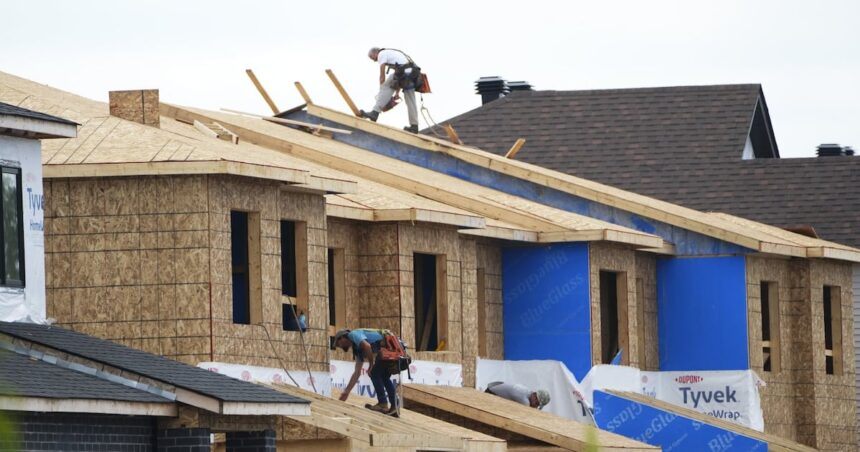The recent slump in Toronto’s new home market could spell disaster for tens of thousands of workers across the region. According to a sobering new report from the Building Industry and Land Development Association (BILD), our construction slowdown might eliminate up to 41,000 jobs by 2029.
As someone who’s spent years covering Toronto’s business landscape, I’ve watched our housing market’s dramatic ups and downs. This latest forecast feels particularly concerning given how deeply construction employment weaves through our local economy.
“We’re seeing a perfect storm of challenges hitting developers right now,” says David Wilkes, BILD’s president and CEO. During our conversation last week, he explained how rising interest rates and approval delays have dramatically slowed new project launches.
The numbers paint a troubling picture. The report indicates new home sales in the Greater Toronto Area dropped nearly 40% below the 10-year average in 2023. This isn’t just about luxury condos downtown – it spans across all housing types and communities throughout the region.
Walking through Liberty Village last Tuesday, I counted six construction sites where work appeared to have slowed or paused entirely. A site supervisor who asked to remain anonymous told me, “We’ve had to let go almost a quarter of our crew already, and that’s just the beginning.”
The economic ripple effects extend beyond just builders and tradespeople. The report suggests each construction job supports approximately 1.5 additional positions in related industries – from appliance sales to landscaping services.
Ontario Home Builders’ Association CEO Luca Bucci points to government policies as a key factor. “Development charges have increased dramatically, sometimes by more than 30% overnight,” he explained during a phone interview. “When you combine that with higher borrowing costs, many projects simply don’t make financial sense anymore.”
What’s particularly concerning is how this slowdown contradicts our region’s desperate need for more housing. Provincial data shows the GTA’s population growing by roughly 100,000 people annually, yet housing starts continue falling behind demand.
During a recent Toronto city council meeting I covered, Housing Secretariat officials presented data showing the city needs approximately 30,000 new housing units annually to keep pace with population growth. Current projections suggest we’ll build less than half that number in 2024.
The employment impacts hit certain demographics particularly hard. Construction has traditionally provided well-paying jobs for new Canadians and workers without post-secondary education. According to Statistics Canada, the average construction wage in Toronto sits around $38 per hour – significantly above minimum wage positions.
“My father came to Canada and built a middle-class life through construction,” explains Maria Gonzalez, a second-generation residential framer I met at a recent industry event. “I’m worried those opportunities are disappearing for the next generation.”
Not everyone views the slowdown as entirely negative. Some market analysts suggest it represents a necessary correction after years of overheated activity and unsustainable price growth.
“The industry became too accustomed to selling anything they built at ever-increasing prices,” notes Sheila MacDonald, a Toronto-based real estate economist I consulted for this piece. “There’s a recalibration happening that could eventually lead to more sustainable development patterns.”
City planners have expressed mixed feelings about the potential job losses. While employment reductions concern them, several mentioned the breathing room a slowdown provides to address infrastructure needs that haven’t kept pace with rapid development.
The report offers several recommendations to avoid the worst-case scenario, including streamlining approval processes, reconsidering development charge increases, and creating tax incentives for affordable housing construction.
Mayor Olivia Chow’s office released a statement acknowledging the report but emphasizing the city’s commitment to addressing housing affordability. “We need to ensure we’re building the right mix of housing while maintaining Toronto’s livability,” the statement reads.
For workers already feeling the pinch, policy discussions provide little immediate comfort. At a College Street coffee shop yesterday, I spoke with Jamie Torres, a plumbing contractor who’s seen his work schedule cut in half this year.
“Politicians talk about housing and jobs like they’re separate issues,” Torres said, stirring his coffee. “But for thousands of us, they’re exactly the same thing.”
The construction industry faces an uncertain future, but history suggests Toronto’s housing market eventually rebounds. The question remains whether that recovery will come quickly enough for the thousands of workers whose livelihoods hang in the balance.







